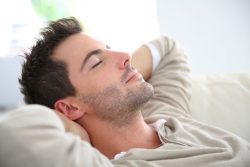Napping and Sleep Apnea: What You Should Know
June 13, 2023
For most people, there is nothing wrong with taking a midday nap. In fact, taking a short break to squeeze in some shuteye could actually provide some solid health benefits. But what if you have sleep apnea? Is it okay to take a nap? This blog post explains what you should know about the connection between napping and sleep apnea.
Napping and Sleep Apnea
There are a couple of reasons why people with obstructive sleep apnea may want to start skipping their daily nap:
- Napping may not refresh you. Sleep apnea can seriously interfere with the quality of your sleep. If you do not have your treatment device (a CPAP machine or oral appliance) with you when you lie down for a nap, you may find that you derive few to no benefits. In fact, you might even wake up more tired than when you dozed off.
- You may find it more difficult to comply with your treatment. Some sleep apnea sufferers who nap find that it is extremely challenging for them to adapt to using their treatment device.
- It might be more challenging to sleep at night. If you nap for too long, it could be difficult for you to fall asleep when you want to at night.
Napping Is a Personal Choice
Of course, whether or not you nap is a personal choice. If you do nap, though, it would be helpful to follow these guidelines:
- Use your treatment. CPAP machines are not very portable. If you have an oral appliance from a dentist, though, you can place it in your briefcase or purse so you can take naps wherever you are, regardless of whether you are snoozing on the sofa or catching some shuteye in your car during your lunch break.
- Be mindful of how long you nap. For most adults, a nap of 20 – 30 minutes can boost alertness. Longer naps may allow you to enter the deeper stages of sleep, so you could wake up feeling groggy.
- Choose the right position. If you sleep on your side or with your head slightly elevated, you are less likely to experience sleep apnea symptoms.
Sleeping Better at Night
If you sleep well at night, you might be less tempted to nap during the day. Here are a few tips to improve your nighttime rest.
- Consistently use your sleep apnea treatment.
- Do not drink caffeine after noon.
- Do not consume alcohol within the last few hours before bedtime.
- Stop using your electronic devices an hour or two before you lie down.
- Do something relaxing to prepare yourself for sleep. For example, you could read a book or take a hot bath.
- Exercise during the day, but not during the last few hours before you try to sleep.
Napping isn’t always good for people with sleep apnea. Try to establish good habits so you can truly benefit from your rest time!
Meet the Practice
Dr. Kenneth Mogell is an experienced sleep dentist who has helped many people to find relief from obstructive sleep apnea via oral appliance therapy. If you would like to speak to him about how you can achieve higher-quality sleep, get in touch with any of our locations or call our Vero Beach office at 772-882-6800.
